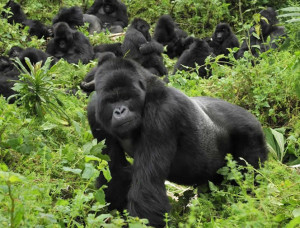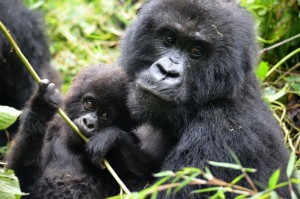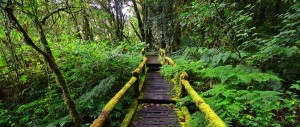Rwanda boasts a wide variety of wildlife. The Parc National des Volcans, in northern Rwanda is home to the world’s largest number of endangered mountain gorillas. Numbering in the hundreds, the gorillas live in a protected area, free from poachers. The gorillas can be viewed in their natural mountain habitats at a fairly close range.
Best known for its wealth of primates, Rwanda also has one of Africa’s richest bird life. A staggering 670 different bird species have been recorded in Rwanda. For botanists, the gorgeous wildflowers of the forests and mountains are capped by more than 100 orchid species in Nyungwe alone.
The Akagera National Park in eastern Rwanda is teeming with wildlife both large and small. They range from Lions, Giraffe, Elephant and Hippopotamus to Hyena, Impala and Gazelle. There is a rich variety of bird life at Akagera as well.
Rwanda also has water bodies which are ideal for water sports and fishing, particularly Lake Kivu in the west of the country and Lake Muhazi in the east. Lake Kivu also offers beautiful beaches, jutting peninsulas and an archipelago of beautiful islands.
Rwanda, in a nutshell, is a nature lover’s paradise. It is also one of the friendliest of countries. A warm welcome is complemented by comfortable facilities, fine food and a rich cultural heritage.
GEOGRAPHY
Rwanda is a landlocked republic in Equatorial Africa, situated on the eastern rim of the Albertine Rift, a western arm of the Great Rift Valley, on the watershed between Africa’s two largest river systems: the Nile and the Congo. Much of the country’s 26,338 km2 is impressively mountainous, the highest peak being Karisimbi (4,507m) in the volcanic Virunga chain protected by the Volcanoes National Park. The largest body of water is Lake Kivu, but there areother numerous lakes around the country, notably Burera, Ruhondo, Muhazi and Mugesera, some of which have erratic shapes following the contours of the steep mountains that enclose them.
ECONOMY
Primarily a subsistence agriculture economy, Rwanda nonetheless produces for export some of the finest tea and coffee in the world. Other industries include sugar, fishing and flowers for export.
GETTING THERE
All International flights arriving in Kigali are with SN Brussels, Kenya Airways Ethiopian Airlines, Air Burundi and Rwandair Express. All international flights arrive at Kigali International Airport,10 Km from central Kigali.
There are two flights a day from Nairobi, two per week direct from Brussels and two per week from Johannesburg.
PASSPORT AND VISA
A valid passport is mandatory. Visas, required by all visitors except nationals of the USA, UK, Germany, Canada, Uganda, Tanzania, Kenya, Burundi, Democratic Republic of Congo, Sweden, Mauritius, South Africa and Hong Kong, cost USD 60 and can be obtained upon arrival.
MONEY
The unit of currency is the Rwanda franc. The US dollar is the hard currency of preference. It may be impossible to exchange travellers’ cheques away from the capital. Credit cards are usually only accepted at the major hotels in Kigali.
LANGUAGE
In addition to the indigenous language of Kinyarwanda, French and English are official languages. French is widely spoken throughout the country. In the capital and other tourist centres, many people speak English.
WHEN TO VISIT
Rwanda can be visited throughout the year. Gorilla trekking and other forest walks are less demanding during the drier months. The European winter is the best time for birds, as Palaearctic migrants supplement resident species.
SAFETY AND HEALTH
A certificate of yellow-fever vaccination is required. Much of Rwanda lies at too high an elevation for malaria to be a major concern, but the disease is present and prophylactic drugs are strongly recommended. It is advisable not to drink tap water. Bottled mineral water can be bought in all towns. Hospitals are located in all major towns.
SEASON AND CLIMATE
A combination of tropical location and high altitude ensures that most of Rwanda has a temperate year-round climate. Temperatures rarely stray above 30 degrees Celsius by day or below 15 degrees Celsius at night throughout the year. The exceptions are the chilly upper slopes of the Virunga Mountains, and the hot low-lying Tanzania border area protected in Akagera National Park. Throughout the country, seasonal variations in temperature are relatively insignificant. Most parts of the country receive in excess of 1,000mm of precipitation annually, with the driest months being July to September and the wettest February to May.
ADDITIONAL INFO
Getting to Rwanda: One can fly to Rwanda with Sabena, Alliance Express/Alliance Air, Ethiopian Airlines, Kenya Airways, Air Tanzania and Air Burundi. All international flights land at Kanombe Airport which is 10kms away from central Kigali.
Passports and visas: A valid passport is mandatory. VISAS ARE NOT REQUIRED FOR NATIONALS OF THE USA, GERMANY, CANADA, UGANDA, TANZANIA, KENYA, BURUNDI AND THE DRC. For further information, please call the Rwandan Embassy/Mission nearest to you.
Health: A certificate for yellow fever vaccination is required. Malaria is present and anti-malarial drugs are recommended. Bottled mineral water, which is available in all major towns, is recommended instead of drinking ordinary tap water.
Money: The unit of currency is the Rwandan franc. The US dollar is the hard currency preference. It may be impossible to exchange travelers’ cheques at a good rate (or at all) away from Kigali. All major credit cards can be used at hotels and good restaurants in Kigali.
Language: In addition to the indigenous language, Kinyarwanda, French and English are the official languages. French is widely spoken throughout the country, while many people speak English in Kigali and the main tourist areas. Kiswahili is also widely spoken around the country.



